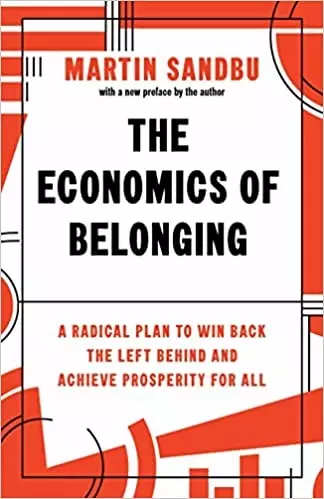The Economics of Belonging:
Martin Sandbu
"The Economics of Belonging: A Radical Plan to Win Back the Left Behind and Achieve Prosperity for All ", Martin Sandbu
5* A convincing endorsement of basic income
In this long, occasionally repetitive discourse, Martin Sandbu delivers a coherent set of policies to remedy failures in the current economic system. He makes the bold claim that political shifts toward populist demagogues are entirely due to ‘the end of economic belonging’ (p10, chapter 3). Technology and productivity have reduced well-paid employment (p 17ff). Equality has surged. But globalisation is not to blame (chapter 5), despite outsourcing jobs reducing aggregate wage. Automation rather than globalisation accounts for the majority of lost jobs (p77, 212).
Having critiqued means-tested welfare benefits for their extreme effective marginal tax rates which create unemployment and poverty traps, Sandbu writes ‘Only one radical welfare reform can fully address this central obstacle to an economy of belonging’ (p115), ie basic income, or UBI. However, having fingered technology as the cause of current economic grief, he unexpectedly dismisses the important technology argument for UBI with a throwaway assertion that ‘economic history teaches us that new jobs will always appear when technological changes make old ones obsolete’ (p116). Equally, after dishing means-tested benefits, he then claims that targeted benefits are more efficient (p116). He is inconsistent on these two points. Sandbu sees UBI restoring power to labour (p121ff), and providing security to precarity. He correctly points out that UBI is a work incentive rather than a disincentive (p119). A substantial UBI is affordable (p120). Macroeconomic policy should maximise demand stimuli (chapter 8). Austerity is a flawed policy (p145).
Chapter 9 addresses the problem of excess debt in the financial system. We have over-indebted people, companies, banks, and governments which all generate deflation (p156). Sandbu suggests a move to more equity in place of debt, more ease of debt restructuring (p159), and a central bank digital currency (p158), but is hesitant to endorse debt-free sovereign money creation, simply on the grounds that ‘it is so radical’ whilst ‘the option is always available’ (p165). The £875bn of UK government debt currently held by the Bank of England is in effect debt-free sovereign money. The urgently necessary associated reform is that limiting central banks to only purchase government debt in the secondary market massively enriches traders in the primary market with zero risk gains in portfolio values and sales margins. This is a moral outrage.
Sandbu favours a net wealth tax, levying corporation tax in the country where sales are made, and an ecology tax (chapter 10). These proposals are problematic. A pure wealth tax should be payable in assets, but this proves difficult, so it morphs into an income tax against a wealth parameter. Forcing multinational companies to pay tax by country sales revenues, rather than by profit in a properly registered country of origin (not tax havens which Sandbu conflates), is hopelessly complex and offers far more loopholes. Does the UK want Rolls Royce Aero Engines to pay corporate tax in countries where it makes sales, rather than in the UK? Ecological taxes should be targeted to reduce pollution, not to raise revenue for UBI.
Whilst here, and in his film on the FT website, Sandbu makes a case for UBI and claims adequate funding, he underplays the full case for UBI and its funding by debt-free sovereign money creation. Sound arguments for UBI do include that from technology which as a recent paper from the Institute for Policy Research shows, does reduce labour share in the economy. As Sandbu points out in his 2021 preface, the furlough scheme during the Covid pandemic paid £24K/year to 3m people, costing a total of £69bn, all of which was funded within the Bank of England purchase of £875bn government debt, which, since the BoE is owned by the government is zero net debt, ie equivalent to debt-free sovereign money. A recent report from Cambridge Econometrics shows that feeding substantial levels of UBI funded by debt-free sovereign money produces a stable equilibrium, rather than any collapse into inflation or devaluation. UBI initially takes up spare capacity in the economy and then stimulates investment to increase output in non-inflationary growth.
The book is available here.
Geoff Crocker
Editor ‘The Case for Universal Basic Income'
www.ubi.org

